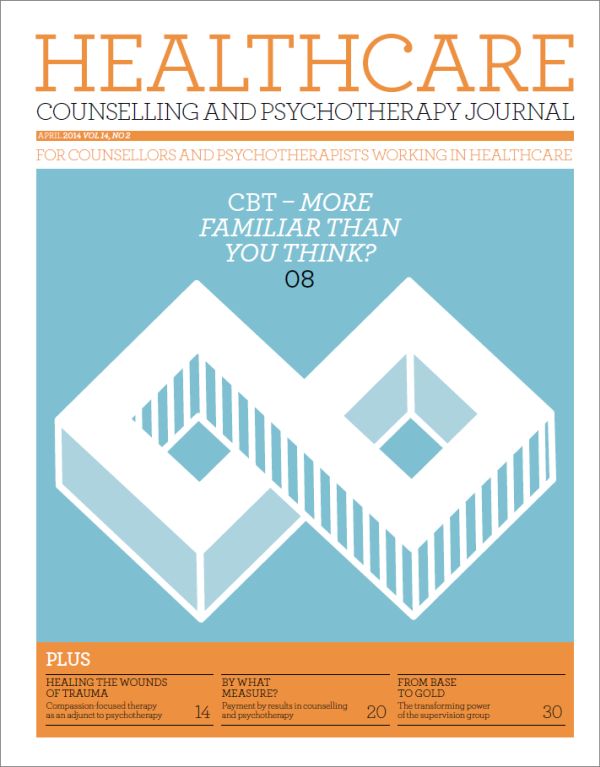In this issue
Features
CBT – more familiar than you think?
As Michael Owens explores some of the similarities between therapeutic approaches, he reckons it’s time we put our differences to one side.
Healing the wounds of trauma, shame and grief
Through a case study, Elaine Beaumont demonstrates the effectiveness of using compassion-focused therapy as an adjunct to psychotherapy.
Payment by results: by what – or whose – measure?
Neville Tomlinson presents a personal view of how counselling and psychotherapy are measured.
Appraising internet self help
A study by David Stuart examined the quality of websites offering mindfulness resources.
From collaboration to consortium
Louise Robinson weighs up the options for third sector engagement in the new NHS commissioning landscape.
From base to gold: the alchemy of the group
Valerie Garrett looks at the transforming power of the supervision group on the unconscious processes operating within it.
Regulars
Chair’s report – BACP Healthcare
Zubeida Ali: Hello and introductions
Development report – BACP Healthcare
Louise Robinson: Creating momentum
GP viewpoint
John Hague: Breaking the door down
Counselling in primary care
Richard Mason: Looking in the right direction
Third sector perspective
Michael Lilley: Closing the gap between life and our values
Resumé
Lee Partis

Articles from this issue are not yet available online. Divisional members and subscribers can download the pdf from the Healthcare Counselling and Psychotherapy Journal archive.
From the editor
One of the benefits of working in NHS-funded services is learning about the different modalities and ways of working of the colleagues we work alongside. The competitive tendering context in which we work, however, can also bring tensions and so lead to a focus on our differences, rather than similarities.
In our lead feature this issue, Michael Owens tackles this subject by considering the common ground between CBT, the person-centred approach, psychodynamic counselling, and existential-phenomenological therapy. ‘Each of the therapies has the same purpose,’ writes Michael, ‘to help clients tackle their problems effectively and improve their health, welfare and quality of life… it should not come as a surprise that there are many similarities’.
Continuing changes to the NHS landscape are not only bringing together therapists working in different modalities – GP commissioning is also opening the door to a range of providers. Increasingly, NHS Trusts are being joined by third sector organisations, private companies, and individual practitioners in winning NHS contracts to provide counselling and psychotherapy. For those of you in the third sector who would like to maximise the current opportunities, Louise Robinson’s article weighs up the options for engagement. As Louise writes, ‘Third sector organisations help represent individuals and groups that are not adequately represented. As such, [they] can influence local provision of a whole range of services, not just their own, by giving voice to the needs of a community.’
What almost every therapist who works in NHS-funded services shares is the need to collect data on the outcomes of our work with clients. While not quibbling with this requirement, Neville Tomlinson centres on the aims of data collection in IAPT services. In a personal view, Neville compares the goals of the IAPT initiative and its links to getting people back to work with those of the principles of the ‘Recovery Model’ which espouses a holistic view, centred on the individual.
Also in this issue, we welcome Zubeida Ali as new Chair of BACP Healthcare. In Zubeida’s first report as Chair, she pays tribute to the division’s outgoing Chair, Tina Campbell – her thanks for all Tina’s hard work are shared by all those involved in the division.
Zubeida would also love to hear your views on any issues you would like the executive to be aware of; and a similar message applies to this journal – your views on any articles in this issue are very welcome.
Sarah Hovington
Editor
hcpj.editorial@bacp.co.uk
